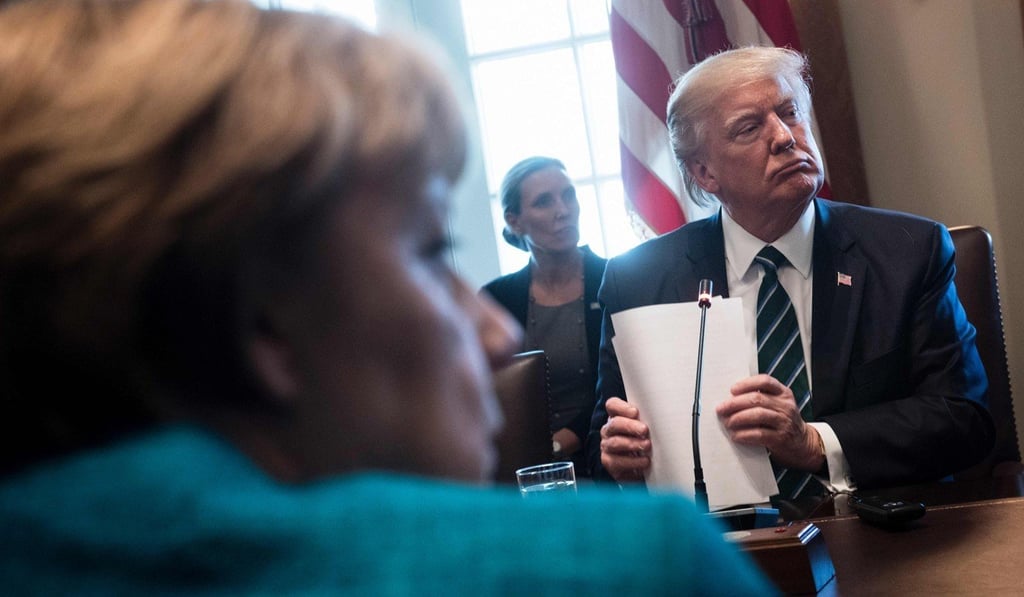Asian Angle | China and the EU were never natural partners, Trump has made them so
The brutal treatment the US president has meted out to a continent he neither understands nor likes has made it clear across EU capitals that depending on an alliance with America would be a folly

An ill wind usually blows someone somewhere some good. And so it has proven between the European Union (EU) and China. The Trump presidency may well be about to achieve what most thought even a few months ago was next to impossible – the injection of some real meaning into the notion that the EU and the People’s Republic might have something approaching a close strategic partnership.
That was the term that was first used in the distant past when Wen Jiabao had just become premier of China in 2003. Back then, with notions of the EU finally lifting the arms embargo imposed on China after the 1989 Tiananmen Square unrest, and with the trade relationship starting to really take off, the Chinese government conferred the title “comprehensive strategic partnership” on the link. There was even hope that the market economy status problem would be cleared up, and despite all the concerns about state involvement, the EU would simply concede and say China was a full, proper market economy.
But then the US placed pressure on the EU, and the embargo stayed. And after a few bruising trade clashes, from the so-called bra wars over textiles and dumping in the late 2000s and then the solar panels argument and the row over steel exports, even the jewel in the crown – pure export and import business – started to grow more tarnished. By 2012, China and the EU entered a more frosty period, when the former’s sense of confidence and prestige regularly clashed with the latter’s sense of being permanently in crisis. “We won’t take any more moral hectoring from old Europe,” a Chinese academic promised to me around this time in Beijing.
Trump hammers Germany as row escalates while Merkel touts reliable ties with India
Donald Trump and his barnstorming performance while with Nato and the G7 in Europe in May changed all that in a matter of days. His failure to support the Nato mutual defence commitment, the cornerstone of the alliance, and his reticence on climate change were only the most prominent of a whole raft of issues. From barging one head of state out of the way to nearly yanking off the arm of another during a ferocious handshake, Trump exposed Europe to the most visceral, and detestable, part of his increasingly narcissistic, bullying style of diplomacy.
The immediate outcome of this was the statement in Frankfurt on May 28 by German Chancellor Angela Merkel that Europe, and in particular the EU, must now look out for its own interests. A half century of patient dialogue, and building of trust, had started to unravel in a matter of hours. For the EU, however, this might be a good thing. As never before, they are having to think of their relations with the outside world unimpeded by accommodating or second-guessing the US. They can now be emboldened enough to pursue their economic and strategic interests. And among all their partners, China stands as the most potentially important, and the most vexed. Vexed, that is, until now.
Why Merkel decided she had to put diplomacy aside and speak up about Trump
The EU-China summit in Brussels has already produced the first fruits of a different kind of relationship. At the heart of this is the very clear common interests both partners have in making sure the Paris Climate Change convention prevails. The EU and China have many differences, for sure, but on this issue, and on defence of free trade, they have never been closer, or spoken a more aligned language. These big matters and the alliance that is emerging between them may well lead to a shift in other areas – from dealing with the market economy status issue, to addressing the bad blood coming from the embargo still being in place.

China and the EU were not natural partners – until the emergence of Trump. Now they have been forced to speak to each other with much more clarity and simplicity. The brutal treatment Trump meted out to a continent he neither understands nor, apparently, much likes has made it clear across the capitals of the EU that some things are now a luxury – and depending on an alliance with a US under such uncertain and poor-quality leadership would be a folly.
Merkel urges Europe to stay united in face of uncertainty from allies US and Britain
This does not make the profound cultural and political links between the EU and America vanish. They will hopefully be sustained through this very difficult period as Trump continues to spread his brand of ill thought out anarchy on the world stage. But it does create spaces to think about relations and alliances in a more nuanced way. Just as the EU and China were never natural partners, nor are they natural enemies. And it has taken Trump to offer final proof of that. ■

